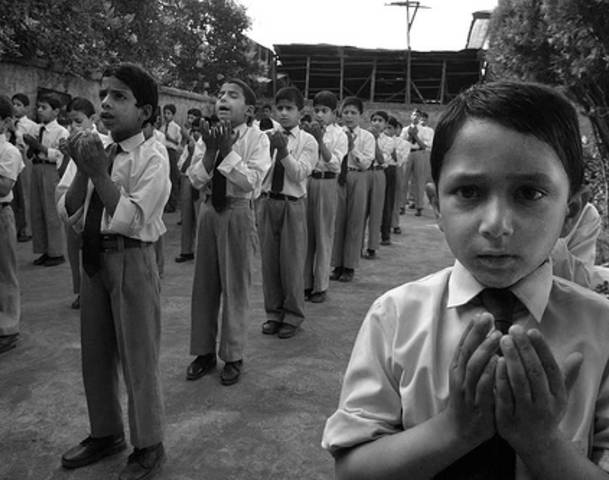Toufiq Rashid
SRINAGAR, May 5:The red and black signage on the off-white building in Bemina, 7 km from Srinagar’s city centre Lal Chowk, reads School for Orphans.
In war-torn Kashmir, orphans and orphanages are aplenty, but what makes Raahat Manzil different is that it’s the only place that is more of a boarding school than a shelter.
“Here an orphan is not an orphan but only a student,” says advocate Abdullah Qazi, chairman of Yateem Khana that runs Raahat Manzil.
What was started by a group of retired educationists, bureaucrats and professionals with 15 students in 2000, now boasts of 43 teachers and, 550 students – 80% of them hostellers. “Those were difficult times. People were dying, leaving behind wailing widows and impoverished children. There were no help groups. Even the UN and UNICEF were not working here. Our endeavour was to set up a place which helped,” says Qazi.
The school is exclusively funded by donations. “People just leave food, mutton and money at the reception, take a receipt and go,” says Qazi.
“Poverty has forced the guardians of most of these children to send them here and we are trying our best to provide them good education and a good living,” says Muneer Ahmad, the vice principal.
According to the 2011 census, J&K has 67.8% literacy and the drop-out rate in schools is 1.5%. The dropout rate for orphans is, however, much worse at 21% (as per an independent study by Kashmir University and Medical College in Srinagar).
Decades of militancy and the devastating earthquake in 2005 have left scores orphaned – official figures put the number at 10,000-15,000, while independent studies say the state has 30,000-40,000 orphans.
That is where Raahat Manzil steps in.
“Even if we are able to make a difference to the lives of only a few hundred students, it will be a great service to humanity,” says Ahmad.
There are some students who have lost their fathers and whose mothers cannot afford to care for them. “Last week we had to enroll two students in the middle of the session because their mother said when the admissions were on she did not have enough money to travel from her village to Srinagar,” says Qazi.
We strive hard to provide the children the best in our limited way, says Qazi. Students’ plain, but neat, white and grey uniforms testify to that. Student quarters and academic buildings are within walking distance. The centrepiece of the campus is a beautiful mosque where students pray five times a day.
“We are not communal, but encourage the children to pray,” says Qazi. The school will soon be upgraded to a degree college and will continue to provide education for free.
‘UNDYING SPIRIT’
What makes the school different is also that it is never closed, except for short breaks. “The families can’t fend for the children so sending them home for three-month vacations is not possible. The flip side is that it gives us an edge over other schools in terms of three extra months to complete the syllabus.”
Last year, a student, Gazi Abdullah, scored 97.5% and attained 15th rank in the state in Class 10 exams of the J&K board. Another five students got distinctions and seven scored first division marks. Abdullah’s father, a schoolteacher at Doda in Jammu, was killed in a cross-firing in 1999.
“We were three siblings and our mother could not afford to send us to school,” says Abdullah, who came to Raahat Manzil in 2003. “I want to be an IAS officer,” says the sprightly young man with determination.
Raahat Manzil will be there with all its support for him.
(Hindustan times)











